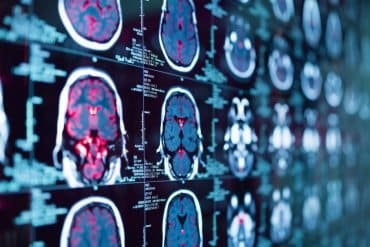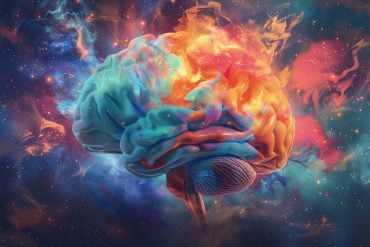Summary: According to researchers, genes linked to autism may have been positively selected during human evolution as they contribute to enhaced cognition.
Source: Yale.
Genetic variants linked to autism spectrum disorders (ASD) may have been positively selected during human evolution because they also contribute to enhanced cognition, a new Yale study suggests.
A genome-wide association study of ASD of more than 5,000 cases and an analysis of evolutionary gene selection showed that inherited variants linked to ASD were found under positive selection in larger numbers than would have been expected by chance.
The final version of the paper was published Feb. 27 in the journal PLOS Genetics.
Variants that have a large negative impact on reproductive success are generally eliminated from the population quickly. However, common variants that occur with high frequency but small effect can cumulatively have big impacts on complex inherited traits — both positive and negative. If variants provide a better chance of survival, they are positively selected, or tend to stay in the genome through generations.
“In this case, we found a strong positive signal that, along with autism spectrum disorder, these variants are also associated with intellectual achievement,” said Renato Polimanti, associate research scientist at Yale School of Medicine and VA Connecticut Health Center in West Haven, and first author of the paper.

For instance, many of the positively selected variants associated with ASD identified by the researchers were enriched for molecular functions related to creation of new neurons.
“It might be difficult to imagine why the large number of gene variants that together give rise to traits like ASD are retained in human populations — why aren’t they just eliminated by evolution?” said Joel Gelernter, the Foundations Fund Professor of Psychiatry, professor of genetics and of neuroscience, and co-author. “The idea is that during evolution these variants that have positive effects on cognitive function were selected, but at a cost — in this case an increased risk of autism spectrum disorders.”
Funding: The work was funded by National Institutes of Health grants and a NARSAD Young Investigator Award from the Brain & Behavior Research Foundation.
Source: Bill Hathaway – Yale
Image Source: NeuroscienceNews.com image is in the public domain.
Original Research: Full open access research for “Widespread signatures of positive selection in common risk alleles associated to autism spectrum disorder” by Renato Polimanti and Joel Gelernter in PLOS Genetics. Published online February 10 2017 doi:10.1371/journal.pgen.1006618
[cbtabs][cbtab title=”MLA”]Yale “Autism Risk Genes Linked to Evolving Brain.” NeuroscienceNews. NeuroscienceNews, 27 February 2017.
<https://neurosciencenews.com/autism-evolution-genetics-6168/>.[/cbtab][cbtab title=”APA”]Yale (2017, February 27). Autism Risk Genes Linked to Evolving Brain. NeuroscienceNew. Retrieved February 27, 2017 from https://neurosciencenews.com/autism-evolution-genetics-6168/[/cbtab][cbtab title=”Chicago”]Yale “Autism Risk Genes Linked to Evolving Brain.” https://neurosciencenews.com/autism-evolution-genetics-6168/ (accessed February 27, 2017).[/cbtab][/cbtabs]
Abstract
Widespread signatures of positive selection in common risk alleles associated to autism spectrum disorder
The human brain is the outcome of innumerable evolutionary processes; the systems genetics of psychiatric disorders could bear their signatures. On this basis, we analyzed five psychiatric disorders, attention deficit hyperactivity disorder, autism spectrum disorder (ASD), bipolar disorder, major depressive disorder, and schizophrenia (SCZ), using GWAS summary statistics from the Psychiatric Genomics Consortium. Machine learning-derived scores were used to investigate two natural-selection scenarios: complete selection (loci where a selected allele reached fixation) and incomplete selection (loci where a selected allele has not yet reached fixation). ASD GWAS results positively correlated with incomplete-selection (p = 3.53*10−4). Variants with ASD GWAS p<0.1 were shown to have a 19%-increased probability to be in the top-5% for incomplete-selection score (OR = 1.19, 95%CI = 1.11–1.8, p = 9.56*10−7). Investigating the effect directions of minor alleles, we observed an enrichment for positive associations in SNPs with ASD GWAS p<0.1 and top-5% incomplete-selection score (permutation p<10−4). Considering the set of these ASD-positive-associated variants, we observed gene-expression enrichments for brain and pituitary tissues (p = 2.3*10−5 and p = 3*10−5, respectively) and 53 gene ontology (GO) enrichments, such as nervous system development (GO:0007399, p = 7.57*10−12), synapse organization (GO:0050808, p = 8.29*10−7), and axon guidance (GO:0007411, p = 1.81*10−7). Previous genetic studies demonstrated that ASD positively correlates with childhood intelligence, college completion, and years of schooling. Accordingly, we hypothesize that certain ASD risk alleles were under positive selection during human evolution due to their involvement in neurogenesis and cognitive ability.
“Widespread signatures of positive selection in common risk alleles associated to autism spectrum disorder” by Renato Polimanti and Joel Gelernter in PLOS Genetics. Published online February 10 2017 doi:10.1371/journal.pgen.1006618






